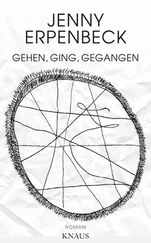Jenny Erpenbeck - The End of Days
Здесь есть возможность читать онлайн «Jenny Erpenbeck - The End of Days» весь текст электронной книги совершенно бесплатно (целиком полную версию без сокращений). В некоторых случаях можно слушать аудио, скачать через торрент в формате fb2 и присутствует краткое содержание. Год выпуска: 2014, Издательство: New Directions Publishing, Жанр: Современная проза, на английском языке. Описание произведения, (предисловие) а так же отзывы посетителей доступны на портале библиотеки ЛибКат.
- Название:The End of Days
- Автор:
- Издательство:New Directions Publishing
- Жанр:
- Год:2014
- ISBN:нет данных
- Рейтинг книги:4 / 5. Голосов: 1
-
Избранное:Добавить в избранное
- Отзывы:
-
Ваша оценка:
- 80
- 1
- 2
- 3
- 4
- 5
The End of Days: краткое содержание, описание и аннотация
Предлагаем к чтению аннотацию, описание, краткое содержание или предисловие (зависит от того, что написал сам автор книги «The End of Days»). Если вы не нашли необходимую информацию о книге — напишите в комментариях, мы постараемся отыскать её.
The End of Days — читать онлайн бесплатно полную книгу (весь текст) целиком
Ниже представлен текст книги, разбитый по страницам. Система сохранения места последней прочитанной страницы, позволяет с удобством читать онлайн бесплатно книгу «The End of Days», без необходимости каждый раз заново искать на чём Вы остановились. Поставьте закладку, и сможете в любой момент перейти на страницу, на которой закончили чтение.
Интервал:
Закладка:
We see each other quite clearly in the course of these exchanges.
Perhaps someone should investigate the strength of the draft created when a soul flits about like this. Perhaps someday flowers will bloom even here, in the middle of the wasteland, perhaps even tulips, perhaps someday the presence of innumerable butterflies will be just as real as the absence of butterflies of any sort today, at minus sixty-three degrees Celsius. Now, like all the rest of the dead, she has all the time in the world to wait for the arrival of different times. For the living, to be sure — who have no other time at their disposal than the one in which they happen to possess a body — the only bit of color they’re able to behold here at night, together with the dead, are these flames.
8
Last summer, when she was still alive, she, along with the other women, had to dig several large trenches just outside the camp, so when winter came and the ground froze, they would have somewhere to be buried. All of them — she and her friends, her enemies, and also those who were indifferent to them — they all dug graves to be kept in reserve.
On one particular day during the summer of ’41, she drove her pickaxe into the earth at a specific point and began to dig her own grave, without knowing, of course, that this was the exact place on all this infinite earth destined to become her dwelling for the eternal winter. The coordinates 45.61404 degrees latitude north and 70.75195 degrees longitude east would be what people would use to describe this otherwise nameless place, where on a summer’s day, at forty degrees Celsius, she would drive her pickaxe into the dry sand, making grass, tiny insects, and dust fly around, for the earth here was completely dry far down into its depths.
How lovely is your dwelling place, oh Lord of Hosts.
One night during the winter of ’41, while everyone was asleep, the woman on duty pulled the cold right leg of a dead woman out from beneath the warm leg of a sleeping woman, she dragged the lifeless body out of the barrack, and brought it to the barrack for the dead. At such temperatures it takes less than two days for a body like this, including all the flesh covering its bones, to freeze into a skeleton.
Many years ago one person said a word, and then another said another word, words moved the air, words were written down on paper with ink and clipped into binders. Air was balanced out with air, and ink with ink. It’s a shame that no one can see the boundary where words made of air and words made of ink are transformed into something real: as real as a bag of flour, a crowd in which revolt is stirring, just as real as the sound with which the frozen bones of Comrade H. slid down into a pit in the winter of ’41, sounding like someone tossing wooden domino tiles back into their box. When it’s cold enough, something that was once made of flesh and blood can sound just like wood.
INTERMEZZO
Comrade Ö., who always used to refer privately — i.e. in conversation with his wife — to Comrade H. as a narrow-lipped hysteric , places her dossier on the left-hand stack on his desk, not the stack to his right.
The stack on the left is forwarded to Comrade B.
Comrade B., opening the file, remembers that he once visited H. and his wife at their dacha many years ago and that the wife had baked an excellent apple strudel. But an apple strudel cannot be sufficient grounds for sparing a counterrevolutionary element. For this reason he places the dossier on the left-hand stack, not the stack to his right.
The stack on the left is forwarded to Comrade S.
Comrade S. wonders whether, if Comrade H. were to be arrested — and was she still a comrade to begin with? — she might say something disadvantageous about him in the hope of saving her own skin. Had he ever said anything to her that might somehow incriminate him? Since he cannot remember anything of the sort, he places her file on the left-hand stack on his desk, not the stack to his right.
The stack on the left is forwarded to Comrade L.
Comrade L. reads the account Comrade H. has written of her life, which is included in her dossier, up to the point where it becomes clear that the Comrade H. who was recently arrested is her husband. This H. once literally accused him during a debate of having no balls . For this reason, without hesitation, he places the account of the life of Comrade H. — the wife of Comrade H. and someone he never actually met in person — back in her dossier, he closes it and places it on the left-hand stack on his desk, not the stack to his right.
The stack on the left is forwarded to Comrade F.
Comrade F. knows Comrade H. quite well, and also knows her husband, who has already been arrested. He considers it utterly implausible that the two of them could be Trotskyist spies as has been alleged. The stack on the right-hand side of his desk already contains five dossiers of good friends on whose behalf he means to intercede directly with Stalin. More than five can’t possibly work, of this he’s quite aware.
He gets up and takes a bottle of vodka from the shelf. While he is filling his glass all the way to the rim, placing it against his lower lip and knocking it back, he thinks about how during one of the last Writers Union debates he was described as a hopeless drunk .
He goes back to his desk and places the dossier of Comrade H. to the left. Later he forwards all the files from the left-hand stack to his Soviet Comrade Shu.
Soviet Comrade Shu. is required — according to NKVD Order No. 00439, Order No. 00485 and other orders relating to national arrest quotas — to make fifty arrests from each of the following groups: Germans, Poles, Koreans, Greeks, and Iranians by the end of this month, October 1938. To assemble these lists, he proceeds alphabetically, in other words begins with the letter A. for each nationality.
Working through the Iranian contingent, he gets to the letter N.
With the Greeks, to S.
With the Koreans, to L.
With the Poles to D.
And with the Germans to F.
As he is preparing these lists, he makes a minor error, confusing the name Comrade H. used to enter the Soviet Union with her real name. In the fake German passport she used to enter the Soviet Union four years ago, her name was Lisa Fahrenwald, F. for short.
But she’s still lucky to have wound up at the end of the list, because the first ten persons in each contingent fall into Category 1. For Category 1 the sentence is: death by firing squad.
But for Category 2 — in other words, for the remaining forty persons on each list, including H., who figures here mistakenly under the name Lisa Fahrenwald — the sentence is only: prison camp, eight to ten years.
But things might also have gone quite differently.
Comrade Ö., who always used to refer to Comrade H. privately — i.e. in conversation with his wife — as a narrow-lipped hysteric , would still have placed her dossier on the left-hand stack on his desk, not the stack to his right. And the stack on the left would still have been forwarded to Comrade B.
But if Comrade B. had, for example, not only remembered Comrade H.’s excellent apple strudel but also stopped to consider that if she were to be interrogated, she would quite likely mention him as an acquaintance if not a friend on the basis of his visit to their dacha; he would probably have found it advisable to place her dossier on the right-hand stack.
But if this thought had not occurred to him, if Comrade H.’s dossier had remained there on the left-hand stack, then after the file was forwarded, Comrade S. might perhaps have remembered that right after the assembly that past March at which their Party group had responded to Bukharin’s conviction, he had been standing with Comrade H. and his wife and in a moment of high spirits he’d told a political joke.
Читать дальшеИнтервал:
Закладка:
Похожие книги на «The End of Days»
Представляем Вашему вниманию похожие книги на «The End of Days» списком для выбора. Мы отобрали схожую по названию и смыслу литературу в надежде предоставить читателям больше вариантов отыскать новые, интересные, ещё непрочитанные произведения.
Обсуждение, отзывы о книге «The End of Days» и просто собственные мнения читателей. Оставьте ваши комментарии, напишите, что Вы думаете о произведении, его смысле или главных героях. Укажите что конкретно понравилось, а что нет, и почему Вы так считаете.












